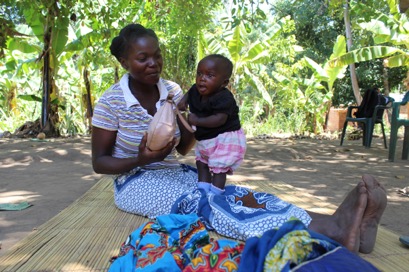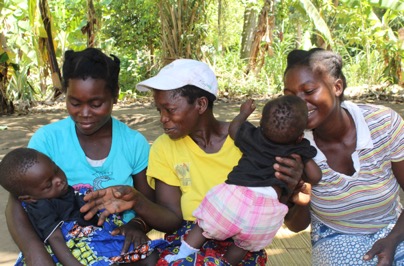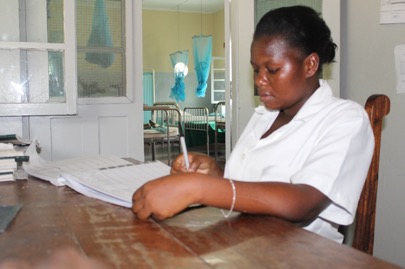In the rich farmlands of Birua Village, in Furquia Locality, Namacurra District, Zambézia Province, lives 52 year old Paulina Raposo. She has been a traditional birth attendant for 36 years.
“I learned to be a traditional birth attendant at the hospital in Macuse [in Zambézia] in 1980. It was war time and there was a need for people who were prepared to help in the communities. I was one of the chosen ones,” she told us.
Feligência José and her daughter Dilma.
Since then, it has become her life’s work; she has never stopped delivering babies. She has lost count of the number of deliveries she has assisted over her career, but she is certain that her work and life took a positive turn in 2014, when she began attending community lectures supported by Friends in Global Health (FGH). “Before, we used to assist deliveries in the communities without any equipment at all. But we now accompany pregnant women to the hospital. It is much better like this because there they get the assistance they need,” she explained to us. Through the community lectures or palestras, she learned about the risks involved in non-institutional deliveries. She learned how to counsel pregnant women and to encourage them to go to the health facility for antenatal care, including HIV testing.
“They must not refuse to take the HIV test. It is important for you to know what you have so that you can take care of your health, and your baby’s health. For example, I once counseled a lady to take the test and she got upset with me. But I insisted so much that she ended up going to the health facility to take the test. Today she is healthy, and I have counseled many others who are now healthy.”
Paulina Raposo (TBA) and two of her clients; Feligência José with her daughter, and Valdívia Elias with her son Eliasito.
Paulina feels like her work is appreciated at the health facility. Between January and December 2016, she referred 131 pregnant women to the health facility closest to their community for antenatal care and encouraged them to deliver their babies there. The nearest health facility is over 15 km from Paulina’s house. She often makes the journey with the women she has referred, to assist along the way if needed. She recognizes the importance of receiving care at a health facility, where healthcare workers are better able to assist with the complications that can arise in pregnancy.“There are a lot of complications. Imagine a woman is HIV infected. What are you going to do? And if there are delivery complications, how are you going to solve them? It is also not possible to know if a child has problems if they have not been seen [by the health facility].” We spoke to Paulina in her backyard. While we were with her, she received a visit from two women she referred to the health facility in the past: Feligência José, with her young daughter, Dilma, and Valdívia Elias, and her son Eliasito. “I had my daughter in May of this year [2016]. I started feeling labor pains around 7:00 in the evening and I came right here to Paulina's house. She accompanied me to the health facility. We got there around 10:00 pm. At 11:00 pm, my daughter was born,” Feligência told us happily. Valdívia Elias had a similar experience, and she is thankful for the support she received from Paulina. “We now have a maternity ward here at Furquia's health facility. It is an important step. But it is not easy to walk there on foot, let alone at night and feeling labor pains. Therefore, it is important to have a traditional midwife’s help, to intervene in case something happens along the way. We feel safer like this,” Valdívia told us, looking down at little Eliasito.
 Olímpia Fortunato - Maternal and Child Health Nurse in Namacurra District.
Olímpia Fortunato - Maternal and Child Health Nurse in Namacurra District.
Olímpia Fortunato, Namacurra District's maternal and child health supervisor, estimates that 30% of deliveries in the health facilities are the result of the collaboration between the health system and traditional birth attendants. In Birua Village, there are four traditional birth attendants. Thanks to their work, thousands of children have been born. These women are valued and appreciated within the community. “They do great work because they have a lot of credibilities. But there is one factor that does not play in their favor, which is the fact that they sometimes live very far away, which makes contact with us difficult,” Olímpia notes. The collaboration with traditional birth attendants is an initiative of Zambézia’s Provincial Health Directorate (DPS) with the support of FGH, through the Male Involvement Strategy. This strategy implements its activities through Male Champions and traditional birth attendants, who create demand for the use of health facility-based antenatal services by pregnant women and their partners. They encourage institutional delivery, family planning for couples, adherence to child at risk consultations, HIV testing of couples at the antenatal consultation, and ART adherence. There are 438 traditional birth attendants that work in collaboration with the FGH supported Male Engagement Strategy in 9 districts of Zambézia Province. As a result of their work, from October 2015 to December 2016, 34,651 women were referred to antenatal consultations at health facilities.


